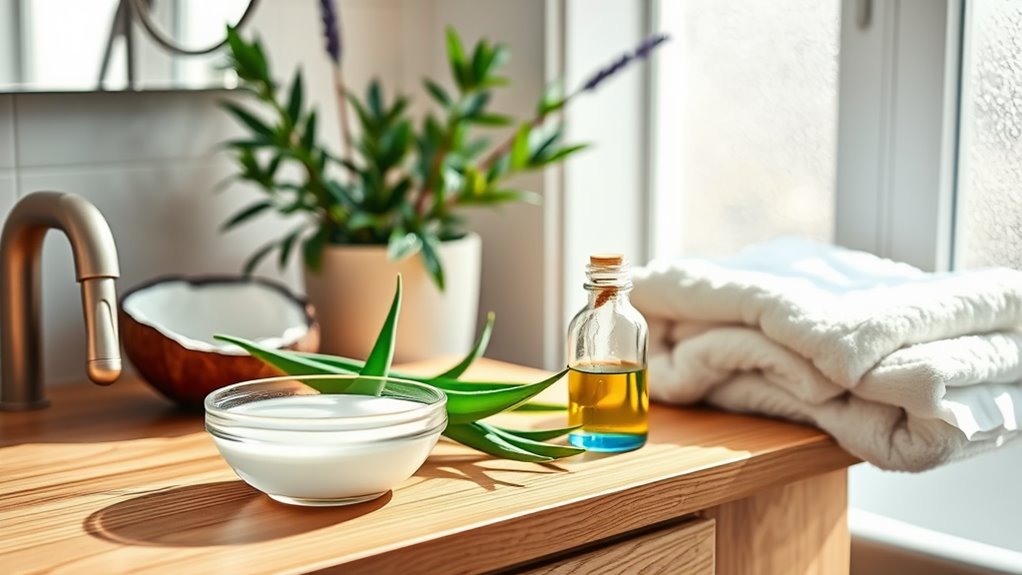Tired of Bloating. This Natural Fix Works Wonders!
You can find lasting relief from bloating by making simple natural adjustments to your daily routine. Start by identifying your personal triggers through food journaling, then incorporate proven remedies like peppermint tea, ginger root, and fennel seeds. Eating slowly, taking post-meal walks, and staying hydrated will strengthen your digestive health. Discover how these science-backed solutions can transform your gut wellness and comfort forever.
Understanding Your Bloating Triggers
Why do some people feel bloated after certain meals while others don’t? The answer lies in understanding your unique digestive triggers. Everyone’s body responds differently to foods, eating habits, and lifestyle factors.
To identify your personal bloating triggers, start keeping a food and symptom diary. Note what you eat, when you eat, and how you feel afterward. You’ll likely notice patterns emerging that’ll help you make better choices. Common triggers include dairy products, gluten, carbonated drinks, and eating too quickly.
These digestive comfort tips can help you take control: chew your food thoroughly, eat smaller portions, and avoid talking while eating. Additionally, consider how stress affects your digestion, as anxiety often contributes to bloating. Remember, you’re not alone in this journey – many people struggle with bloating, but understanding your triggers is the first step toward feeling better.
The Science Behind Natural Digestive Health
While many people turn to over-the-counter solutions for digestive issues, your body has built-in mechanisms designed to maintain gut health naturally. Your digestive system works with beneficial bacteria, enzymes, and hormones to break down food and absorb nutrients efficiently.
When you’re in a relaxed state, your body activates the parasympathetic nervous system, often called “rest and digest.” This triggers the release of digestive enzymes and increases gut motility.
Your gut microbiome, home to trillions of beneficial bacteria, plays a crucial role in reducing inflammation and bloating. You’ll enhance these natural processes by supporting your body’s rhythm. Probiotics maintain a balanced gut environment, which can further aid in minimizing digestive discomfort.
Chewing thoroughly stimulates digestive enzymes, while eating at regular times helps maintain your circadian rhythm. Your gut-brain axis, the communication highway between your digestive system and brain, responds positively to mindful eating practices and stress management techniques, naturally reducing bloating without artificial interventions.
Top Herbal Remedies for Instant Relief
You’ll find quick relief with peppermint tea, which relaxes your digestive muscles and eases uncomfortable gas. Ginger root, whether steeped in hot water or chewed raw, reduces inflammation and calms your upset stomach within minutes.
Keep fennel seeds in your pantry – they’re your allies against bloating. Chew a small handful after meals or brew them into a soothing tea.
Chamomile isn’t just for bedtime; it’s a powerful anti-inflammatory that settles your stomach and reduces water retention. For those tough bloating episodes, caraway seeds work wonders by breaking down hard-to-digest foods.
You can also try a combination of these herbs for enhanced effects. Mix peppermint with ginger, or blend fennel with chamomile.
Incorporating probiotics for gut health into your routine can further support digestion and prevent future bloating issues.
These time-tested remedies have helped countless others find relief, and they’re waiting in your kitchen to help you too.
Daily Habits That Prevent Bloating
Start your morning by drinking warm lemon water, which kickstarts digestion and reduces inflammation.
Eat slowly and chew thoroughly – you’ll notice many seasoned wellness enthusiasts practice this simple technique. When planning meals, avoid common trigger foods like dairy, processed items, and carbonated drinks.
Stay active with a daily 20-minute walk after meals, as movement helps prevent gas buildup. You’ll want to maintain regular meal times and stop eating three hours before bedtime.
Remember to track your water intake and aim for eight glasses daily, but don’t drink large amounts during meals.
Consider keeping a food diary to identify your personal triggers, just as many successful bloat-free individuals have done. Incorporating fiber-rich foods into your diet can also help support digestive health and minimize bloating.
These proven habits will help you maintain a comfortable, bloat-free lifestyle.
Simple Meal Planning for a Bloat-Free Life
Creating a bloat-free meal plan doesn’t require complex calculations or strict diets.
You’ll find success by focusing on simple, whole foods and mindful portion sizes that work with your lifestyle.
Start by planning three balanced meals daily, spacing them 4-5 hours apart. Include lean proteins, fiber-rich vegetables, and complex carbohydrates in portions that fit your palm.
You’ll want to keep a food diary to track which combinations work best for your body.
Make your grocery list bloat-proof by choosing fresh produce, unprocessed grains, and natural proteins.
Stock up on anti-bloating heroes like ginger, peppermint, and fennel to incorporate into your meals. Incorporating gut-friendly foods into your meal prep, like yogurt with probiotics, can also support digestion.
When meal prepping, cook larger batches of bloat-friendly foods you can mix and match throughout the week.
Remember to stay flexible with your plan – if certain foods trigger discomfort, swap them out for alternatives that make you feel energized and comfortable.




